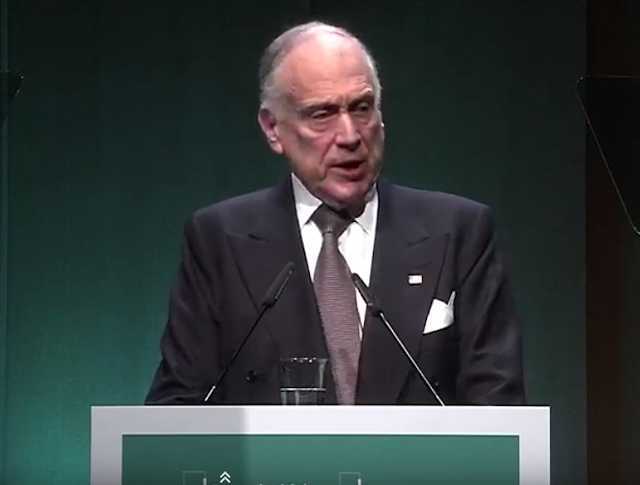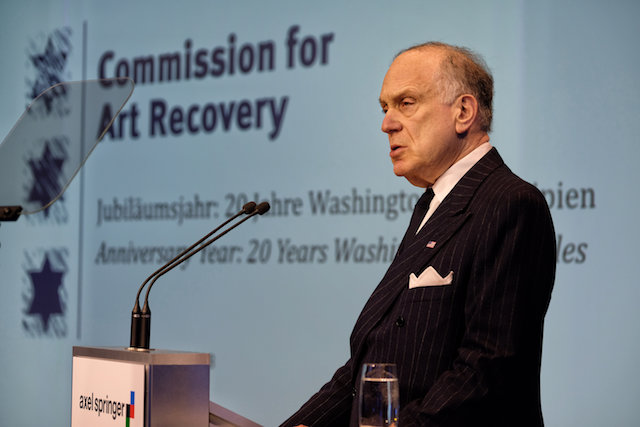News
Federal President Steinmeier congratulates the President of the World Jewish Congress on his 75th birthday (English translation)
"With works from Max Stern’s forced liquidation of his dealership by the Nazis still regularly turning up in Germany, two current
restitution claims by his heirs could have major ramifications for all those seeking to recover looted art."
Article continued

Keynote Speech by Ronald S. Lauder, President of the World Jewish Congress and Chairman of the Commission for Art Recovery (Transcript)
Ronald Lauder expected to attend Nazi looted art conference in Berlin (26-28 November). Twenty years after the adoption of the so-called Washington Principles, around 1,000 experts from all over the world want to again discuss the correct handling of Nazi looted art.
Nazi-looted Art Work from Max-Stern is restituted to heirs. A sale is planned in the Düsseldorf auction house.
The President of the World Jewish Congress, Ronald Lauder, has called on Germany to become more involved in dealing with Nazi looted art.
The FDP is putting pressure, in a new attempt to reform the Limbach Commission?
Following the FDP's push to reform the German government's handling of Nazi looted art, the president of the World Jewish Congress has spoken up.
Geisel rebuffed by World Jewish Congress The desired conversation with Ronald Lauder during the trip to the United States did not come about. There is still a great divide.
The Swabian town of Weinsberg announced on Monday that it would return a work that gallerist Max Stern had to give up in the Third Reich to his heirs. The decision is closely linked with Dusseldorf.
A Nazi-looted artwork from Stern Collection is restituted.
Dispute over exhibition: Düsseldorf hopes for a cultural foundation.

Martin U.K. Lengemann for WELT
Following criticism of the Limbach Commission's inefficiency and unrepresentative membership, German Culture Minister Monika Grütters has undertaken to review the panel's structure and present a proposal for its reform.
Rüdiger Mahlo, Representative of the "Conference on Jewish Material Claims against Germany", calls for a law regulating the return of looted art in Germany as well as for unrestricted access to archives and information necessary for sound provenance research.
The Project "Provenance Research Gurlitt" promised to increase transparency and has digitised documents from Cornelius Gurlitt's estate, accessible at the Federal Archive. The objects' quality has been criticized as poor, lacking the necessary quality for in-depth provenance research.
Bavarian authorities have misused more than 10,000 confiscated artworks, entrusted to them by the US-authorities after World War II. In some cases, artworks were even sold back to former Nazis or their families.
The academic libraries in Germany have announced that they will cooperate closely in their efforts to identify objects in their collections that were stolen from Jewish families by the Nazi regime. They highlight that the establishment of a common research database is particularly necessary.
The Bundeskunsthalle in Bonn and the Museum of Fine Arts Bern are planning joint exhibitions on the "Schwabing Art trove". The exhibitions shall present the current state of research in the Gurlitt case and increase transparency.
State Minister Monika Grütters is planning an exhibition of artworks belonging to Cornelius Gurlitt’s estate – even though ownership is still unclear. This demonstrates the Minister’s questionable handling and information policy with regard to the Gurlitt case.
The final report on the Taskforce "Schwabing Art Trove" was published by its leadership without the consent of the Taskforce’s members. The incident demonstrates the shortcomings in the organisation of the process.
The Taskforce “Schwabing Art Trove” has presented its results. There are many indications that Cornelius Gurlitt was only a pawn of the justice systems and politics.
In the aftermath of the Gurlitt case, pressure on Swiss museums to introduce a dispute resolution mechanism has increased. The Museum of Fine Arts Bern proposed a model based on the German Limbach Commission – most Swiss museums, however, have reacted cautiously.
Ronald S. Lauder, President of the World Jewish Congress and Chairman of the Commission for Art Recovery, voices disappointment about the German Federal Government’s poor efforts to identify the rightful owners of looted art in Germany.
Charlotte Knobloch, former Vice-President of the World Jewish Congress, criticises the fact that even 70 years after the end of World War II, undiscovered looted art is being passed on from one generation to another, with the heirs often unaware of what they have inherited.
